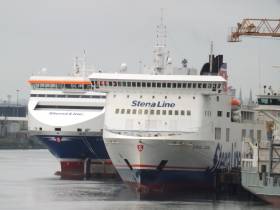Displaying items by tag: Belfast services record
Services on Stena's Belfast Routes Deliver Record Trade in 2017
#FerryNews- Services on Stena Line's Belfast-Scotland and England routes in 2017 marked another record trading year for freight and passenger operations.
Freight volumes on its Belfast to Cairnryan, Liverpool and Heysham routes exceeded a record 514 000 units, which represents a 3% year on year increase.
Car volumes topped 360 000, a 2.5% year on year increase with over 1.5m passengers accounting for a similar 2.5% annual increase. Coach traffic delivered the biggest increase at 10.5% underscoring Belfast’s ongoing tourist boom.
Belfast services have been growing significantly over the last five years with a 15% growth in car volumes, a 13% rise in passenger numbers and a 19% increase in freight traffic. A programme of ongoing investment in its ports and ships has been a key factor in this success and today Belfast represents Stena Line’s largest operational hub with seven ships providing up to 22 daily crossing options.
Paul Grant, Stena Line’s Trade Director (Irish Sea North) said: “Whilst Stena Line has delivered a record performance in 2017, we will continue to focus on providing even higher levels of customer service in 2018 which is why we will be investing a further £500k in the upgrade of our onboard passenger facilities this spring.
Paul Grant added: “Consistent year on year growth of our Belfast-based services also positions us at the forefront of Stena Line’s future European investment plans which is why the Irish Sea has been able to attract a number of new build ships to be deployed in the region in 2019/20. While we continue to invest we will also lobby hard for road improvement upgrades, especially the dualling of the A75 in Scotland, to help improve overall journey times for the key Northern Ireland road haulage and tourism sectors.”
The ferry operator is Belfast Harbour’s largest logistics customer and a key contributor to its success in recent years. Joe O’Neil, CEO Belfast Harbour commented: “Belfast Harbour’s on-going success is supported by another record year for Stena Line. We have been partners for more than 20 years and have seen their business here grow significantly during that time. 2017 is no different with increases in passengers, freight, cars and coaches. This is down to their vision and hard work as well as adapting to the market and we look forward to continuing to support them and the growth of their business in the coming years.”
In addition to the Belfast services, Stena Line operate Dublin to Holyhead, Rosslare to Fishguard routes and a direct continental service on the Ireland-France link between Rosslare and Cherbourg





























































